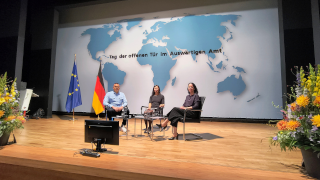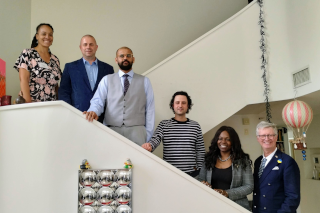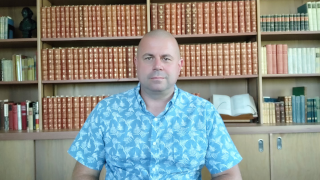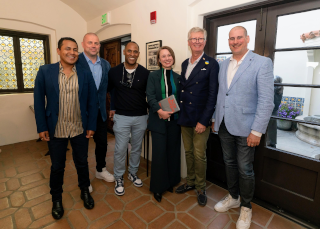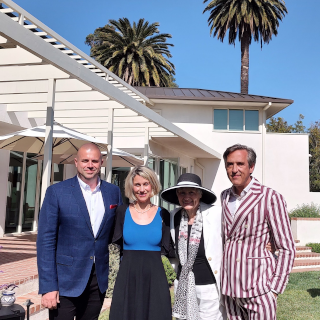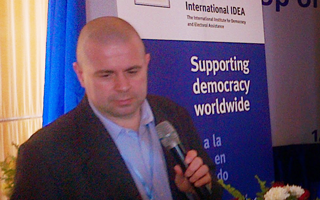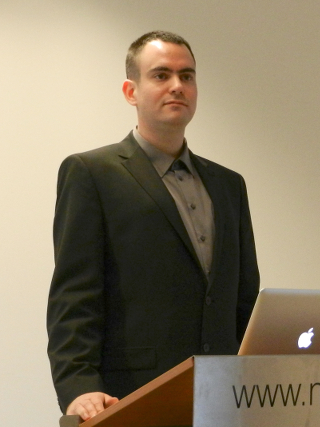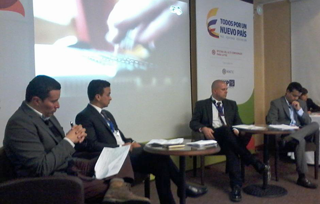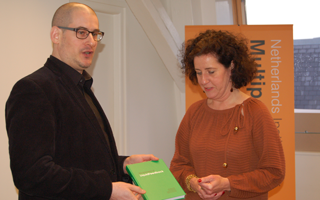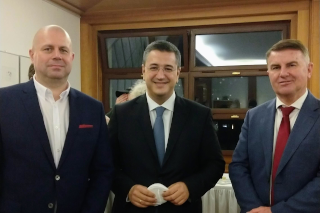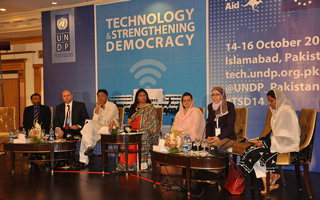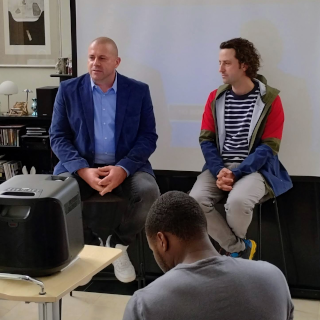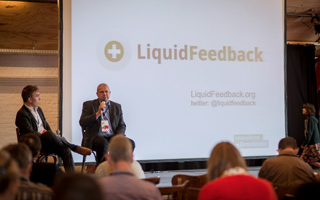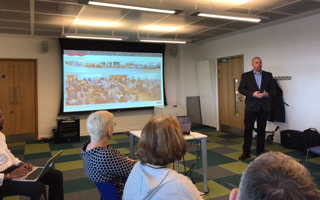on December 14, 2025
We study voting in continuous multi-dimensional spaces beyond single-peak preference ballots.
While single-peak methods allow voters to specify a singular most-preferred candidate, they do not allow voters to express indifference, different importance, or a lack of knowledge regarding particular dimensions.
We propose Nested Convex Voting, which we believe to be a novel method for continuous multi-dimensional voting.
In this approach, each voter submits a finite sequence of nested convex sets of candidates with decreasing weights.
The first convex set represents a set of equally ranked peak preferences, while subsequent convex sets allow voters to express a willingness to compromise within delimited regions of the candidate space.
» Read more…
on December 01, 2025
This article presents the hypothesis that using aggregation functions in mass-deliberation systems — summarizing participants' viewpoints and showing aggregated, representative viewpoints to them — may under certain conditions induce a discursive shift.
Specifically, game theoretic incentives may encourage participants to strategically submit extreme proposals.
Using examples, including median aggregation and "k-means"-like clustering, we demonstrate that some aggregation functions can reward strategically extreme proposals.
We suspect that a violation of the triangle inequality when measuring distances of viewpoints is relevant for this effect.
» Read more…
on October 10, 2025
At the Digital Democracy The Hague 2025 conference, the Horizon Europe project PERYCLES — Participatory Democracy that Scales participated in the Academic Track with a dedicated session exploring how digital technologies can strengthen democratic legitimacy and enable participatory decision-making at scale.
» Read more…
on September 17, 2025
PERYCLES hosts the symposium “Is there hope for deliberative democracy yet? Socio-technical solutions to current political challenges” as part of the 21st annual conference of the Italian Association of Cognitive Sciences (AISC), themed “Connected minds. Dynamic interactions in cognitive, social, and artificial systems.” The symposium explores how deliberative democracy scales in today’s geopolitical climate and in the context of rapidly evolving digital infrastructures. The program features four perspectives from the project.
» Read more…
on September 01, 2025
Digital Democracy Podcast | In this interview, Andreas Nitsche explores liquid democracy as a process. He explains how transitive delegations enable large-scale participation, and how adaptive representation patterns emerge as people adjust their delegation choices over time. Drawing on a recent paper co-authored with Davide Grossi as part of the PERYCLES project, he highlights that transitive delegation does not create runaway power but instead acts as a balancing mechanism. The discussion also touches on recall and suspension in LiquidFeedback before concluding with an examination of delegation cycles.
» Read more…
on August 23, 2025
As part of the German Federal Government’s Open Day on August 23 and 24, 2025, the Federal Foreign Office invited guests to a special “State Visit.” In the Weltsaal, Ulrike Klinger (University of Amsterdam) and Andreas Nitsche (LiquidFeedback, PERYCLES) discussed the question: “Artificial Intelligence – Opportunity or Threat to Democracies?” The conversation was moderated by Siyuan He (Federal Foreign Office).
» Read more…
on June 24, 2025
At the Innovationsforum 2025 conference in Berlin, leading figures from politics, business, civil society, academia, and the media came together.
The goal of the event was to highlight successful strategies, promote mutual learning, and develop effective solutions to key societal challenges.
» Read more…
on June 14, 2025
The research paper "Delegations as Adaptive Representation Patterns: Rethinking Influence in Liquid Democracy" was co-authored by Davide Grossi and Andreas Nitsche as part of the PERYCLES project. Nitsche presented the paper at this year's European Network for Digital Democracy conference, held on June 12 at the Centre d’Économie de la Sorbonne in Paris. He opened with a thought-provoking challenge:
» Read more…
on March 15, 2025
LiquidFeedback Journeys | LiquidFeedback is a framework for deliberation and collective decision-making designed to facilitate constructive debates. It is one of the most prominent implementations of liquid democracy. This episode will tell the "Story of LiquidFeedback" from its inception in 2009 to its participation in the PERYCLES project from 2025 onward. PERYCLES is funded by the European Union.
» Read more…
on December 10, 2024
LiquidFeedback Journeys | Deliberation and informed decision-making is the focus of the third episode in our podcast series. The "Great Taco Debate" among high school students highlights the empowerment that can come from deliberation leading to an informed decision. This uplifting experience is reflected in the song "Para todos hay un taco." Enjoy!
» Read more…
on November 14, 2024
LiquidFeedback Journeys | Our second episode features “A Letter from LA,” followed by the “LiquidFeedback Rap (Ambient).” The emphasis is on staying engaged and informed, creating a more participatory, respectful democracy where everyone has a fair chance to be heard.
» Read more…
on October 15, 2024
LiquidFeedback Journeys | The first episode opens with "Algorithms for Good," which draws inspiration from the eponymous article by Andreas Nitsche. The accompanying song is "Digital Dawn." We hope you enjoy this inaugural episode.
» Read more…
by Davide Grossi, Ulrike Hahn, Michael Mäs, Andreas Nitsche,
Jan Behrens, Niclas Boehmer, Markus Brill, Ulle Endriss, Umberto Grandi, Adrian Haret, Jobst Heitzig, Nicolien Janssens, Catholijn M. Jonker, Marijn A. Keijzer, Axel Kistner, Martin Lackner, Alexandra Lieben, Anna Mikhaylovskaya, Pradeep K. Murukannaiah, Carlo Proietti, Manon Revel, Élise Rouméas, Ehud Shapiro, Gogulapati Sreedurga, Björn Swierczek, Nimrod Talmon, Paolo Turrini, Zoi Terzopoulou, Frederik Van De Putte
on January 30, 2024
This white paper outlines a long-term scientific vision for the development of digital-democracy technology. We contend that if digital democracy is to meet the ambition of enabling a participatory renewal in our societies, then a comprehensive multi-methods research effort is required that could, over the years, support its development in a democratically principled, empirically and computationally informed way.
» Read more…
by Ulrike Hahn, Michael Mäs, Andreas Nitsche
on July 24, 2023
National Coalition for Equity Impact (NCEI) Summit #2
in Santa Monica, California
This is the transcript of the debate on Using Deliberative Conversation Methods to Bridge Divides and the panel on Building Bridges with Algorithms — Standards for a Strong and Equitable Digital Democracy, presenting German and European experiences and perspectives.
» Read more…
on May 22, 2023
Los Angeles Green New Deal is one of the most ambitious and comprehensive programs for greening a metropolitan area. Aiming at carbon neutrality and sustainability generally requires utilizing extensive digital networks, efficient and inclusive data economy applications, and smart city solutions.
» Read more…
on April 26, 2023
A discussion about ‘Innovations in Equity - Contextualizing US and International Perspectives’ and the many
promises and perils of inclusive practices across spaces, including, standards development, neurodiversity, digital equity, algorithms/machine learning and Artificial Intelligence (AI). The goal of this summit is to articulate ways that we might co-create responses to inequities in these spaces in order to support the inclusion of marginalized populations equitably in public policy decisions.
» Read more…
on October 10, 2022
Scientists from both sides of the Atlantic gather at the Lorentz Center in Leiden for a one week workshop in order to discuss digital democracy, social networks, algorithmic fairness, social influence, argumentation, and collective intelligence.
» Read more…
on July 31, 2022
In recent years, on both sides of the Atlantic, we have observed the rise of populism along with growing levels of polarization and radicalization. Democracies are challenged by disinformation and online social networks have reshaped the way in which public opinion forms. Democratic societies experience a lack of dialogue between parts of society. At the Thomas Mann House, Martin Kaplan, Professor of Entertainment, Media and Society at the University of Southern California's Annenberg School for Communication and Journalism, and 2022 Thomas Mann Fellow Andreas Nitsche get into conversation about what can be done to re-enable dialogue between segregated parts of society taking differences and commonalities between Germany and the United States into account. They explore the nexus between quality journalism and the prospects of large scale deliberation. They also address (new) communication strategies and their ethical implications.
» Read more…
on May 18, 2022
What is it like to live and work in the former home of the Mann family? What topic will you be pursuing during your fellowship? And what are you most looking forward to during your time here in California? The Thomas Mann House sat down with Andreas Nitsche, Computer Scientist and 2022 Thomas Mann House Fellow, to talk about his project and time in California.
» Read more…
on April 07, 2022
Thomas Mann House in Los Angeles hosted a four-day, multi-platform program in April 2022 with innovators from academia, artistic fields and politics to discuss concrete steps for restoring public trust in Germany and the U.S.
» Read more…
by Andreas Nitsche
On both sides of the Atlantic, liquid democracy continues to strike a chord in the field of democratic self-organization. By embracing individual freedom of choice, it seeks to reconcile the idealistic appeal of pure democracy with the practicality of representation. Liquid democracy is of particular interest for democratic governance in civil society organizations, legislative bodies, and cooperatives.
» Read more…
by Jan Behrens, Axel Kistner, Andreas Nitsche, Björn Swierczek on March 28, 2021
In ongoing discussions on liquid democracy, we sometimes find arguments which appear to be based on the isolated examination of delegation graphs for a single decision as the underlying model. We believe that a comprehensive analysis of the functionality and the impact of liquid democracy requires a broader view, namely adding a temporal dimension to delegation models.
» Read more…
by Andreas Nitsche on July 14, 2020
The Centre for Democratic Engagement and the UK House of Commons have joined forces to develop a network of academics and practitioners across the world, to critically examine public engagement with parliament: the International Parliament Engagement Network (IPEN).
» Read more…
by Andreas Nitsche on June 06, 2019
School of Mathematics, University of Leeds, June 6-7 2019
Funded by the London Mathematical Society
The 2-day workshop brings together mathematicians and data analysts from academia, industry, NGOs and government, focused on how mathematics and data can and are being used to drive social progress.
» Read more…
by Axel Kistner on November 03, 2016
The Institute of Advanced Studies (ISA) of Europe’s oldest university, the University of Bologna, organized a workshop on “The Future of Democracy”. A workshop on the topic of democracy and participation is by its nature multidisciplinary, involving mathematics, computer science, social psychology, and political science. Invited speakers are experts from several European countries.
» Read more…
by Axel Kistner on June 21, 2016
The COST Action IC1205 Industry Day [1] is held in Toulouse, France on June 21, 2016. The aim of the Industry Day is to bridge the gap between current theoretical research in computational social choice and innovative applications in industry and policy making related to collective decision making.
Andreas Nitsche, board member of the Association for Interactive Democracy, will deliver a keynote on the topic “LiquidFeedback and a fair process of decision making”. Other keynote speakers are Craig Boutilier (Google, USA), Elliott Peranson (National Matching Services Inc., Canada), Jacques Traoré (Orange Labs, France) and Matthew Robb (NHS Blood and Transplant, UK).
» Read more…
by Axel Kistner on May 25, 2016
The Gottlieb Duttweiler Institute [1] in Rüschlikon/Zurich, Switzerland executed a creative workshop for members of the Swiss water economy in October 2015. In cooperation with partners from science, economy and culture the participants discussed extreme scenarios for the management of water supply and distribution. LiquidFeedback [2] was used to discuss, comment and evaluate several scenarios. The workshop also revealed the chances provided by LiquidFeedback for restructuring currently static procedures and complex processes.
» Read more…
by Axel Kistner on August 06, 2015
The Office of the High Commissioner for Peace (OACP) to the Colombian government has invited Andreas Nitsche, Board Member of Interaktive Demokratie e. V. - Association for Interactive Democracy to attend the conference “Conectados por la Paz” in Bogotá, Colombia on August 5, 2015. Public officials and advisors from different agencies of the national government and members of civil society organizations, examined the role that ICT could play in the promotion of citizen engagement during the implementation of the agreements that result from the current peace negotiations between the Colombian Government and the FARC.
» Read more…
by Axel Kistner on October 12, 2014
The United Nations Development Programme (UNDP) [1] [2] has invited Andreas Nitsche, Board Member of Interaktive Demokratie e. V. - Association for Interactive Democracy [3] to attend the conference “Technology & Strengthening Democracy” [4] to be held in Islamabad, Pakistan from October 14 - 16 2014. The conference will discuss the role of technology in strengthening democracy.
Nitsche will present LiquidFeedback [5] with a focus on political party development and on how technology can be applied to provide a fully self organized proposition development and decision-making process. He will elaborate on challenges and solutions for a fair democratic process: collective moderation, minority protection, dealing with noisy minorities, preferential voting and verifiability.
» Read more…
by Axel Kistner on November 10, 2013
The Asia-Europe Foundation (ASEF), Singapur, organized a workshop “Political Parties and the Citizens” to be held in Yangon, Myanmar from 14 – 16 November 2013. [1] The workshop is part of the Democratisation And Justice Series [2] of the Political and Economic Department of ASEF. [3] The workshop focuses on how political parties interact with citizens and citizen movements in countries across Asia and Europe.
» Read more…






